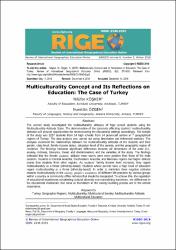| dc.contributor.author | Köşker N. | |
| dc.contributor.author | Özgen N. | |
| dc.date.accessioned | 2020-06-25T15:17:55Z | |
| dc.date.available | 2020-06-25T15:17:55Z | |
| dc.date.issued | 2018 | |
| dc.identifier.citation | Köşker, N., Özgen, N. (2018). Multiculturality Concept and Its Reflections on Education: The Case of Turkey. Review of International Geographical Education, 8(3), 571 - 600. | en_US |
| dc.identifier.issn | 21460353 | |
| dc.identifier.uri | https://hdl.handle.net/20.500.12587/2570 | |
| dc.description.abstract | The current study investigated the multiculturality attitudes of high school students using the Multiculturality Attitude Scale. The determination of the dynamics affecting students' multiculturality attitudes will provide opportunities for reconstructing the educational settings accordingly. The sample of the study was 2237 students from 24 high schools from 14 provincial centres in 7 geographical regions of Turkey. The data analysis was carried out using descriptive and inferential statistics. The analyses examined the relationships between the multiculturality attitudes of the students and their gender, class level, family income status, education level of the parents, and the geographic region of residence. The findings indicated significant differences between all dimensions of the scale (i.e., anxiety, richness, tolerance, threat, and discrimination) and the variables of the study. The findings indicated that the female students' attitude mean scores were more positive than those of the male students. Students in Central Anatolia, Southeastern Anatolia, and Marmara regions had higher attitude scores than students from other regions. As students' family income level increases, they regard multiculturality as a threat (ethnicity-based). Students whose parents have a high level of education regard multiculturality as a threat (ethnicity-based). In order to minimize these negative attitudes towards multiculturality in the society, people's awareness of different life practices by various groups within a country or community offers richness that should be recognized. To achieve this, the regulation of educational experiences considering cultural diversity and normalizing transitions, the differences in the educational institutions that serve as foundation in the society-building process are of the utmost importance. © RIGEO 2018. | en_US |
| dc.language.iso | eng | en_US |
| dc.publisher | Eyup Artvinli | en_US |
| dc.rights | info:eu-repo/semantics/openAccess | en_US |
| dc.subject | Geographic regions | en_US |
| dc.subject | Multicultural education | en_US |
| dc.subject | Multicultural society | en_US |
| dc.subject | Multiculturality | en_US |
| dc.subject | Multiculturality attitude | en_US |
| dc.subject | Turkey | en_US |
| dc.title | Multiculturality concept and its reflections on education: The case of Turkey | en_US |
| dc.type | article | en_US |
| dc.contributor.department | Kırıkkale Üniversitesi | en_US |
| dc.identifier.volume | 8 | en_US |
| dc.identifier.issue | 3 | en_US |
| dc.identifier.startpage | 571 | en_US |
| dc.identifier.endpage | 600 | en_US |
| dc.relation.journal | Review of International Geographical Education Online | en_US |
| dc.relation.publicationcategory | Makale - Ulusal Hakemli Dergi - Kurum Öğretim Elemanı | en_US |
















